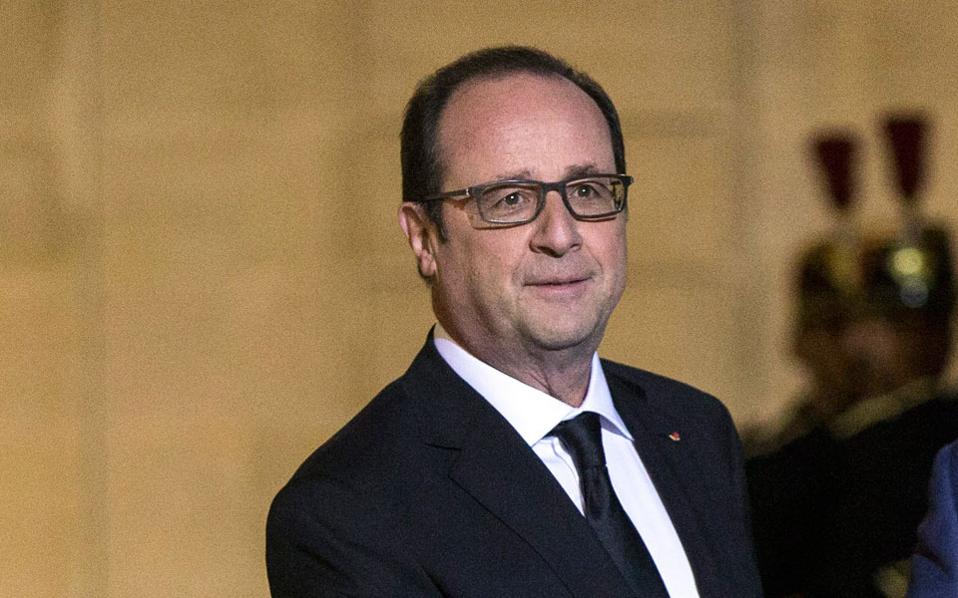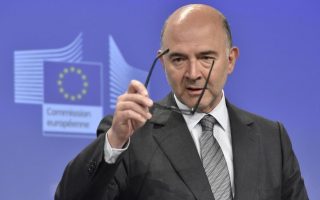French president says ‘I’m here to help’ ahead of Athens visit

French President Francois Hollande is in Athens on an official two-day visit to Athens to meet with Greek government officials. Speaking to Kathimerini ahead of his visit, the French president stressed his determination to support the government’s reform drive for extricating Greece from six years of crisis.
During your last official visit in February 2013, you insisted on the need for Greece to implement the reforms it had agreed to with its international lenders. Have you noticed any changes since then? Do you believe the present government will implement the memorandum?
Greece and its partners signed a very important agreement on July 13 which marks a determination to keep Greece permanently anchored in the eurozone, according to the wishes of the Greek people. This agreement is based on responsibility and solidarity: responsibility on the part of the Greek government – and I salute the courage and lucidity of [Prime Minister] Alexis Tsipras – and solidarity from Europe toward Greece. The Greek Parliament has shown its determination in adopting these reforms by a large majority. The aim is to modernize the state and revive the Greek economy. The steps in that direction are well known: ratifying the measures, passing the first review, recapitalizing the banks and starting a discussion on debt servicing. The program is very loaded and the deadlines are short but it is time for Greece to exit the crisis once and for all. And I will be there to help it, as I have always done from the table of the European Council.
You are one of the few leaders who have steadfastly supported Greece since the start of the crisis. Now can we lay the possibility of a Greek exit from the eurozone to rest?
Yes. That discussion belongs to the past and we need to look to the future with trust. The reforms that must be implemented are decisive and difficult. And the Greek people have already made a huge effort and agreed to many sacrifices. But after the implementation of reforms, there will be growth and employment. A Greek turnaround is imperative for Europe. It will bring stability and confidence. I am coming to Greece to express France’s support, but also to send a message, particularly to French companies: Come and invest in Greece.
Do you believe that Europe is changing and that the dogma of austerity could be replaced by a different policy?
Europe has rules and they need to be respected. They are harmonized with the cohesion and stability of the euro. But streamlining public finances should not be an end in itself. Europe needs to move in the direction of investments. This is the point of the [European Commission President Jean-Claude] Juncker plan and this is the point of structural funds. Greece needs to take advantage of every opportunity that is presented to it. A plan worth 35 billion euros has already been agreed. The European Investment Bank can also act. Likewise, the Greek youth needs to benefit, mainly from the European Union’s educational programs.
Could French companies help Greece by investing in the country? And if so, how, and in which sectors?
French businesses in Greece already employ 12,000 people. They are present in many sectors. I will be meeting with their representatives on the occasion of my visit and I will ask them to further increase their involvement in Greece. A very promising meeting has already been held in Paris between the Federation of Greek Enterprises (SEV) and its French counterpart MEDEF. Our embassy’s services are also mobilized. During my visit, Alexis Tsipras and I will take the initiative to identify the areas in which France could invest and, more importantly, mobilize the interest of French businesses.
Greece, like the rest of Europe, is facing an unprecedented influx of refugees fleeing war. What measures would you propose to deal with this crisis?
Faced with this dramatic situation, our guiding principles should again be responsibility and solidarity. Responsibility because Greece, like Italy, needs to create the infrastructure for receiving and identifying people reaching Europe, the so-called hotspots. Solidarity because Europe cannot leave Greece alone in this. It has a duty to provide all the necessary means for helping the refugees, who need to be relocated to all member-states, and escorting irregular migrants. This is the role of European organizations like Frontex and [the European Asylum Support Office] EASO, and France will be providing dozens of experts in this framework. Europe also has a responsibility to help the countries that are already accepting refugees at the gates of Europe – I am thinking mainly of Lebanon and Jordan – and organizing the necessary cooperation with Turkey on the basis of mutual and specific commitments.





